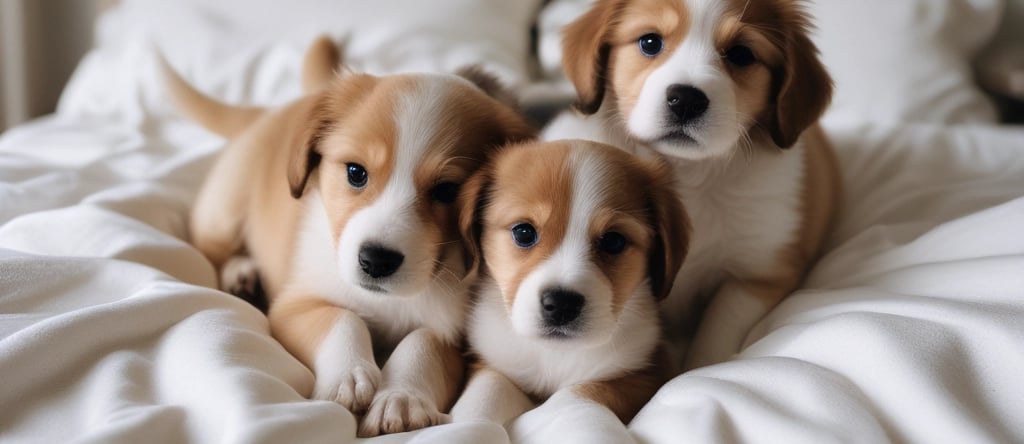important things to know about training puppies
Proper training is crucial for helping your puppy develop good behaviorcription. In this article, we'll discuss the most important things to know about training puppies..:


important things to know about training puppies
Welcoming a new puppy into your home can be an exciting and joyful experience. However, it also comes with significant responsibilities, particularly when it comes to training. Proper training is crucial for helping your puppy develop good behavior, preventing unwanted habits, and strengthening your bond with them. In this article, we'll discuss the most important things to know about training puppies.
1. Start Early
The sooner you start training your puppy, the better. Puppies are most receptive to new experiences and learning between 8 and 16 weeks old. During this critical period, they develop their social skills, learn basic obedience commands, and form habits that will last a lifetime. Delaying training can lead to behavioral problems and make it more challenging to correct unwanted habits.
2. Positive Reinforcement
Positive reinforcement is a powerful training method that focuses on rewarding good behavior rather than punishing bad behavior. This approach encourages your puppy to repeat desired actions, such as sitting or staying, by associating them with treats, praise, and affection. Positive reinforcement helps build trust, confidence, and a strong bond between you and your puppy.
3. Consistency is Key
Consistency is vital when training a puppy. Establish a routine and stick to it, including feeding times, playtime, and sleep schedules. Use positive reinforcement techniques consistently, and ensure all family members are on the same page. Inconsistency can confuse your puppy and slow down the training process.
4. Socialization
Socialization is a critical aspect of puppy training. Expose your puppy to various environments, people, animals, and experiences to help them become confident and calm in new situations. Socialization helps prevent fear-based aggression and anxiety, making it easier to interact with your puppy in public.
5. Basic Obedience Commands
Teaching basic obedience commands is essential for every puppy. Start with simple commands like:
* Sit
* Stay
* Come
* Down
* Leave it
* Heel
These commands will help you communicate with your puppy effectively and lay the foundation for more advanced training.
6. Housebreaking
Housebreaking can be a challenging task, but with patience and consistency, your puppy will learn to eliminate outside. Establish a designated potty area, and take your puppy there frequently, especially after meals and playtime. Praise and reward your puppy when they eliminate in the correct area.
7. Crate Training
Crate training is a valuable tool for puppy owners. Crates provide a safe space for your puppy to relax, sleep, and learn to hold their bladder. Introduce the crate gradually, making it a positive experience with treats and toys.
8. Be Patient
Training a puppy requires patience, as they have short attention spans and may not understand what you want at first. Avoid punishment or frustration, as this can create anxiety and slow down the training process.
9. Use High-Value Rewards
High-value rewards, such as tasty treats and praise, motivate your puppy to learn and repeat desired behaviors. Use rewards strategically to reinforce good behavior, especially during the early stages of training.
10. Seek Professional Help
If you're experiencing difficulties with puppy training or addressing specific behavioral issues, consider seeking professional help from a certified dog trainer or behaviorist. They can provide personalized guidance, help you identify underlying issues, and develop a customized training plan.
11. Keep Training Sessions Short
Puppies have short attention spans, so keep training sessions short and fun. Aim for 10-15 minute training sessions, several times a day.
12. Make it Fun
Make training a positive and enjoyable experience for your puppy. Use playful tones, enthusiastic praise, and rewarding treats to keep your puppy engaged and motivated.
13. Be Clear and Concise
Use clear and concise commands, avoiding complex sentences or long phrases. Puppies respond best to simple, one-word commands, such as "sit" or "stay."
14. Practice Regularly
Regular practice reinforces what your puppy has learned and helps solidify new habits. Schedule regular training sessions, and incorporate training into your daily routine.
15. Celebrate Small Victories
Celebrate small victories along the way, even if it's just a small step forward. Positive reinforcement and celebration help motivate you and your puppy to continue training.
In conclusion, training a puppy requires patience, consistency, and positive reinforcement. By understanding these essential tips, you'll be well on your way to raising a well-behaved, well-adjusted, and loving companion.
Remember to start early, socialize your puppy, and seek professional help when needed. With time, effort, and dedication, you'll develop a strong bond with your puppy and enjoy a lifelong friendship.





